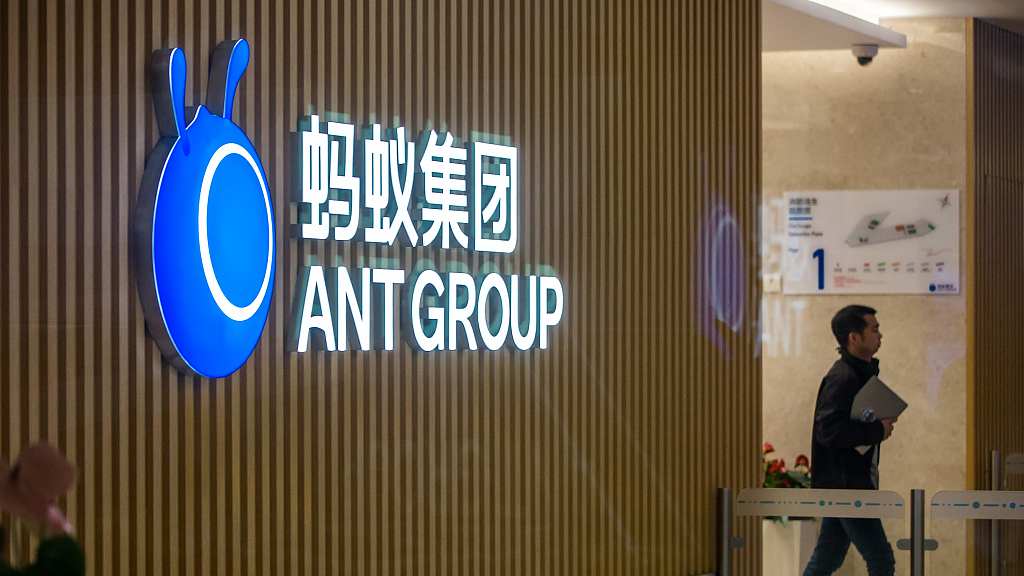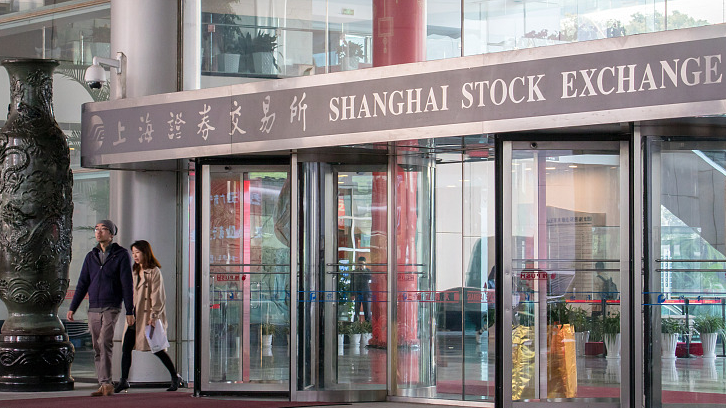
Editor's note: Liu Chunsheng is an associate professor at the Central University of Finance and Economics in China and deputy dean of Blue Source Capital Research Institute. The article reflects the author's opinion, and not necessarily the views of CGTN.
On November 3, the Shanghai Stock Exchange issued the "Decision on Suspending the Initial Public Offering of Ant Technology Group Co., Ltd" on its official website. Later on, Ant Group issued a statement to investors that its plan for a simultaneous listing on the Hong Kong Stock Exchange would also be suspended.
Prior to this, Ant Group had long been a magnet for attention in the capital market, with numerous halos above its head. When the news of Ant Group's IPO came out, five strategic placement funds investing in this company started their share sale exclusively on the third-party platform of Alipay, and the fund shares were quickly sold out. Later, Ant Group set the price for its IPO on the Shanghai Stock Exchange at 68.8 yuan per share, making it the world's biggest-ever IPO. With a total valuation of 2.1 trillion yuan, Ant Group was set to overtake Kweichow Moutai to become the A-share company with the largest market cap. If the IPO went on as scheduled, it would set multiple records.
This triumphant spectacle came to an abrupt end with Jack Ma, the de facto controller of Ant Group, speaking at the Bund Summit in Shanghai and the ensuing uproar. On November 2, the People's Bank of China, China Banking and Insurance Regulatory Commission (CBIRC), China Securities Regulatory Commission (CSRC), and State Administration of Foreign Exchange (SAFE) conducted a regulatory interview with Jack Ma, Chairman Jing Xiandong, and President Hu Xiaoming. On the same day, the CBIRC issued the draft version of the "Provisional Administrative Measures on Online Micro-loan Operations", which the market widely interpreted as a move to tighten up control over Ant Group's lending business.
From an objective point of view, since its inception, Ant Group's innovation in financial technology has indeed played a leading role in the development of China's digital economy, and it has also made outstanding contributions in driving the digital transformation of the global modern service industry with technology and innovation. As a celebrity company and a unicorn, once going public, it would undoubtedly boost the reputation and attractiveness of the Science and Technology Innovation Board.

The Shanghai Stock Exchange. /Xinhua
The Shanghai Stock Exchange. /Xinhua
However, the bigger the corporate behemoth is, the more cautious we should be about it. First of all, Ant Group has changed its name several times in an attempt to shake off its characterization as a financial company. In doing so, it is clearly looking for opportunities for regulatory arbitrage. If we take a look at Ant Group's prospectus, its main revenue from digital financial services has accounted for more than 60 percent of its total revenue, while the micro-lending business has contributed more than 60 percent of its digital finance revenue.
Ant's micro-lending business is mainly made up of three pillars: credit card-like consumer lending (Huabei), small unsecured personal lending (Jiebei), and lending to small and micro-companies. Although Ant Group brands itself as an innovator, its innovation-driven business accounts for less than 1 percent of its revenue. It's actually engaged in traditional financial business under the guise of tech innovation. Yet, it's reluctant to be included in the financial regulatory system.
Secondly, has technology changed the nature of finance? At least not yet. Credit is still the cornerstone of finance. Tech development cannot iron out economic cycles, and therefore it cannot stamp out systemic financial risks. Technology, however innovative it is, will be eventually applied to some kind of financial entities, be it a business or an individual. It's true that digital technology is better at identifying financial risks, but only with strong regulations can the sound development of the financial sector and the prosperity of the real economy be guaranteed.
Finally, after more than a decade of high-speed growth, the Internet economy is where companies and regulators have gained a lot of experience and also learned many lessons the hard way. It is understandable for the authorities to set out regulatory guidelines and industry standards when the time is ripe. From this perspective, these new rules can not only provide a level playing field for Ant Group and other companies but also help to drive stable development of the industry, enhance corporate compliance with regulations, encourage rational consumer spending, and safeguard investors' wealth.
Of course, from a regulatory point of view, the authorities are not trying to intentionally nip the IPO in the bud because it is equally important to support tech innovation and maintain financial stability. For private companies like Ant Group, which are growing super fast in China's fertile soil, updated regulation is necessary to prevent risks that may arise from financial innovation. With that being said, strengthening communication between regulators and companies to encourage and embrace innovation is also an effective measure to continuously improve regulatory efficiency and capabilities.
Finding the right balance between financial tech innovation and risk prevention to maintain financial stability is not only a test of the wisdom of the regulator but also a test of the wisdom of companies in question. For now, it's hard to predict when Ant Group's IPO will resume, but its pricing and valuation will inevitably be lowered. Nevertheless, this debate over financial tech innovation and financial regulation will be a spectacular one in driving the healthy development of China's digital economy and finance.
(If you want to contribute and have specific expertise, please contact us at opinions@cgtn.com.)